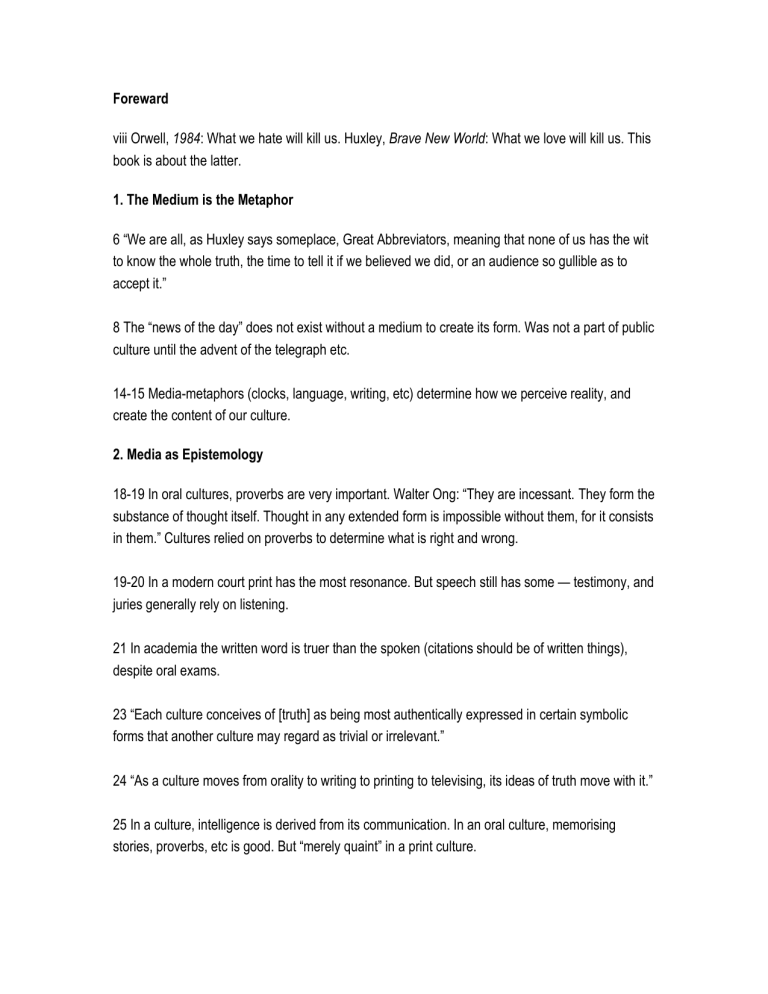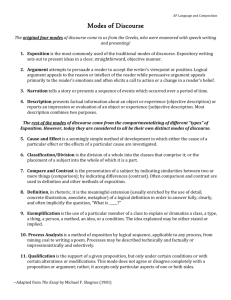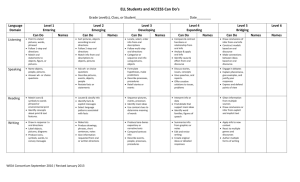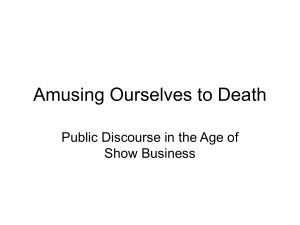Foreward viii Orwell, 1984: What we hate will kill us. Huxley, Brave

Foreward viii Orwell, 1984: What we hate will kill us. Huxley, Brave New World: What we love will kill us. This book is about the latter.
1. The Medium is the Metaphor
6 “We are all, as Huxley says someplace, Great Abbreviators, meaning that none of us has the wit to know the whole truth, the time to tell it if we believed we did, or an audience so gullible as to accept it.”
8 The “news of the day” does not exist without a medium to create its form. Was not a part of public culture until the advent of the telegraph etc.
14-15 Media-metaphors (clocks, language, writing, etc) determine how we perceive reality, and create the content of our culture.
2. Media as Epistemology
18-19 In oral cultures, proverbs are very important. Walter Ong: “They are incessant. They form the substance of thought itself. Thought in any extended form is impossible without them, for it consists in them.” Cultures relied on proverbs to determine what is right and wrong.
19-20 In a modern court print has the most resonance. But speech still has some — testimony, and juries generally rely on listening.
21 In academia the written word is truer than the spoken (citations should be of written things), despite oral exams.
23 “Each culture conceives of [truth] as being most authentically expressed in certain symbolic forms that another culture may regard as trivial or irrelevant.”
24 “As a culture moves from orality to writing to printing to televising, its ideas of truth move with it.”
25 In a culture, intelligence is derived from its communication. In an oral culture, memorising stories, proverbs, etc is good. But “merely quaint” in a print culture.
25-6 In a print culture, to be intelligent you must be able to stay still for some time (to read), read, be somewhat objective to interpret the stance of the author, judge the quality of an argument over the duration of the work, cope with the abstractions of the text.
27 Is not saying changes in media change the structure of minds (although that may be the case) just that new media change the structure of discourse. [How do the web, email, SMS change discourse?]
28 “We have reached, I believe, a critical mass in that electronic media have decisively and irreversibly changed the character of our symbolic environment. We are now a culture whose information, ideas and epistemology are given form by television, not by the printed word.” Just because TV and print coexist, doesn’t mean there is parity — “print is now merely a residual epistemology.” [He suggests that print’s survival is aided by the computer - I assume he’d now, post-Net, see these as different things, or that the computer is bringing a resurgence of “print”?]
29 “Most of our modern ideas about the uses of the intellect were formed by the printed word, as were our ideas about education, knowledge, truth and information. I will try to demonstrate that as typography moves to the periphery of our culture and television takes its place at the center, the seriousness, clarity and, above all, value of public discourse dangerously declines.” [But declines only in terms of what our previous printed-word-based culture determines as desirable surely? Is that definition of intellect objectively “better” than a televisual (or now Net) based one? What would a televisual/Net based definition of intellect be?]
3. Typographic America
33 From 16th century on, all knowledge began to be transferred to the printed page in America.
Books imported from Britain.
34 Reading was not regarded as an elitist activity. Classless.
35 First printing press in US: 1638 at Harvard University.
36 Most early printing was newsletters. Maybe lack of literature was due to lack of paper —
Washington had to write to generals on scraps of paper without envelopes for want of paper. First newspaper: 1690-09-25 by Benjamin Harris in Boston: Publick Occurrences Both Foreign and
Domestick. Banned after first issue.
37 First continuously-published paper: Boston News-Letter from 1704. By 1730, 7 papers published regularly in 4 colonies. By 1800, more than 180 published.
40 Lyceum Movement — a form of adult education. By 1835, more than 3,000 Lyceum lecture halls in 15 states. Intellectuals, writers and humourists spoke there to audiences of all classes.
41 Printed word had a monopoly of public discourse until late 19th century.
4. The Typographic Mind
44-9 Mid 19th century, long speeches to audiences were common at fairs and in politics. 3+ hours not uncommon.
49 Describes Lincoln and Stephen A. Douglas’ speeches in 1858 as “pure print”. [He claims that because speeches were written down in advance, and that the language had sentence structure of written word it has the “resonance of typography”. I’m not convinced. Sounds more like oral culture to me.]
51-2 18th and 19th century, print encouraged rational, objective use of mind to interpret the authors’ position. Lyrical, analytical minds.
58-60 First paid adverts in US newspaper, 1704. Until late 19th century adverts were linear in nature — paragraphs of text conveying information appealing to understanding, not passions. In
1890s illustrations and slogans began to be used.
60 In 18th and 19th century public figures were known by their written words not by their image (or even their spoken words).
63 “The name I give to that period of time during which the American mind submitted itself to the sovereignty of the printing press is the Age of Exposition. Exposition is a mode of thought, a method of learning, and a means of expression. Almost all of the characteristics we associate with mature discourse were amplified by typography, which has the strongest possible bias toward exposition: a sophisticated ability to think conceptually, deductively and sequentially; a high valuation of reason and order; an abhorrence of contradiction; a large capacity for detachment and objectivity; and a tolerance for delayed response. Toward the end of the nineteenth century, for reasons I am most anxious to explain, the Age of Exposition began to pass, and the early signs of its replacement could be discerned. Its replacement was to be the Age of Show Business.”
5. The Peek-a-Boo World
64-5 America was disparate; information could travel only as fast as a train could travel, until the telegraph in mid 19th century. It created its own definition of discourse. Not only permitted, but insisted on a conversation.
66 “The penny newspaper, emerging slightly before telegraphy, in the 1830s, had already begun the process of elevating irrelevance to the status of news.” [The sensationalism seems to scupper his argument that all print was rational and solely informative, makes it sound like pure nostalgia.] Telegraph enabled them to print more national news.
67 Flood of info from far away, much of it irrelevant [why is it necessary irrelevant if from far away?]
68 Today, little of the news we see/hear/read will make us change our daily plans — it’s “inert”, giving us something to talk about but leading to no meaningful action. [The response might be that we can do something by “Thinking global, acting local”.]
69-70 Telegraph brought us information we didn’t ask for, for the first time. Changed the nature of how knowledge was acquired. “To the telegraph, intelligence meant knowing lots of things, not knowing about them.”
71-4 Photography appeared at the same time. It also separates the objects from their contexts. It cannot generalize, can only speak about a specific man, tree, etc. It shows. It can’t be abstract. It’s not a language. A photo implies we know about the world if we accept the photo. But understanding begins when we question what we see.
75 Photography went well with the telegraph’s “news from nowhere”: provided an illusion of context for the unknown names and places.
78-80 We now learn about other communication media through TV [er, and vice versa!]. TV has achieved the status of “myth” in the Barthesian sense (a way of understanding the world that is not problematic, that seems “natural”). We no longer question the role of TV, we accept it [er, no]. The world as given us through TV “seems natural, not bizarre”. Our culture’s adjustment to the epistemology of TV is all but complete..
6. The Age of Show Business
83 McLuhan: “rear-view mirror” thinking — assuming a new medium is merely an extension of an older one.
85 Talking about TV as a specific medium — US TV. Multi-channel, commercial, 24 hour, multi-TVownership.
87 “The problem is not that television presents us with entertaining subject matter but that all subject matter is presented as entertaining, which is another issue altogether.” Everything about news shows presents them as entertainment, not to be taken seriously.
93-8 Examples of priests, doctors, politicians etc relying on showmanship and entertainment over their traditional skills. [Some good points but mostly sounds like a curmudgeonly killjoy.]
7. “Now… This”
99-106 TV News is bad because segments are short and shallow, anchors are required to appear believable, they use music, they have commercials. [Valid points, but, duh. But maybe the fact this is TV news to me, that it seems dumb to criticise these factors, shows how accepting I am of its epistemology.]
107 People have opinions about events but, these days, know little background. More rightly
“emotions” rather than “opinions”.
111-113 [Snipiness about brevity of USA Today’s news, and the inarticulateness of radio phoneins. Lighten up.]
114-124 Religion on TV is different to traditional religion. Delivery is different. Therefore the message is different. The environment in which people witness it is different. The screen is associated with all the secular events it shows. Religious shows must attract audiences and so offer people what they want — a less threatening and demanding religion. Effectively a different religion.
9. Reach Out and Elect Someone
127-8 Capitalism requires rationality. Adverts were once propositions that could be true or false.
Now they appeal to emotions — can’t be tested, not rational.
132 Politicians have gradually become “celebrities”, appearing on TV not just as political figures
(on game shows, commercials, dramas), from 1950s, exploding in 1980s.
136-7 TV provides little context and therefore no history. Continual present.
138-41 Orwell envisaged the government controlling information. But it is more like Huxley. Orwell was more accurate for an age of print where banning books had more impact. Now, despite outcries, it has little effect. Television doesn’t ban books; it displaces them. We have the opposite of censorship — too much TV, but all of the TV is simplistic and noncontextual.
10 Teaching as an Amusing Activity
143 Educational programmes only teach kids to love school if school is like TV. It is, of course, different in many ways — kids might expect to stop watching when they like, behave how they like, etc.
147-8 Three rules that form the philosophy of education that TV offers: No previous knowledge should be required to view a show; there should be no perplexity, only immediately accessible information; there shall be no exposition (the traditional instrument of reasoned discourse.
153-4 There is a danger that TV education will concentrate on teaching things that make good TV, rather than things kids need to learn.
11 The Huxleyan Warning
159-60 TV serves us best with junk TV. It is dangerous when it pretends to be serious (news, documentaries, education, etc). We would be better off if TV got worse (more junk) than better.
160-1 We must gain an awareness of the structure and effects of information, a demystification of media, to have control over TV, computers, any medium. One way: Parodies that demonstrate how
TV should be viewed, how it degrades news etc [The Day Today]. But to work it would have to be so popular as to be co-opted by TV. Self-defeating.
162 Other way: Schools should teach this.







